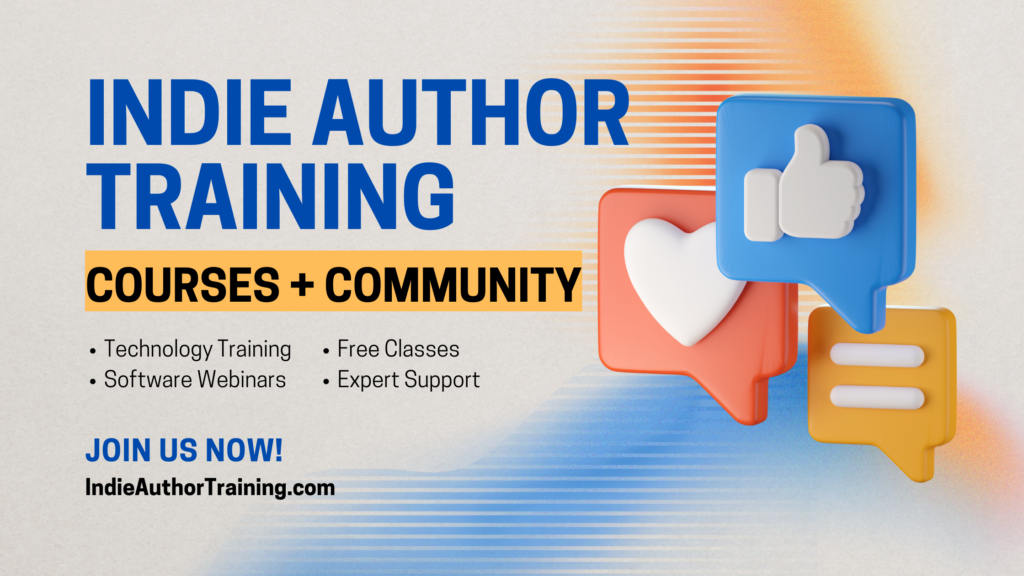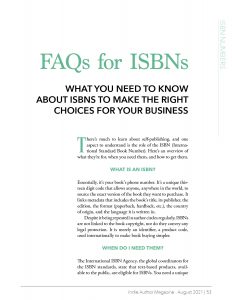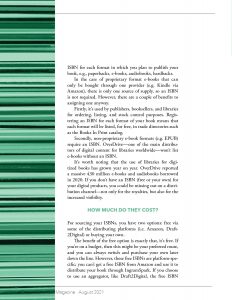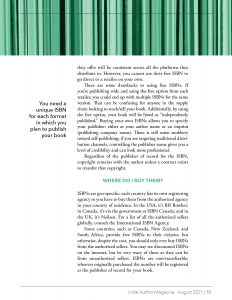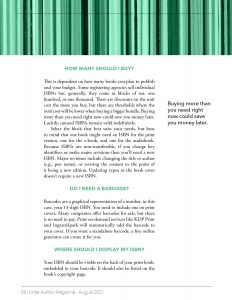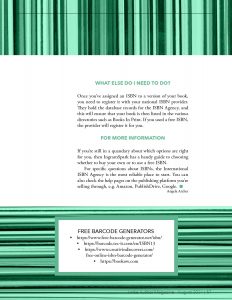What you need to know about ISBNs to make the right choices for your business
There’s much to learn about self-publishing, and one aspect to understand is the role of the ISBN (International Standard Book Number). Here’s an overview of what they’re for, when you need them, and how to get them.
What is an ISBN?
Essentially, it’s your book’s phone number. It’s a unique thirteen digit code that allows anyone, anywhere in the world, to source the exact version of the book they want to purchase. It links metadata that includes the book’s title, its publisher, the edition, the format (paperback, hardback, etc.), the country of origin, and the language it is written in.
Despite it being repeated in author circles regularly, ISBNs are not linked to the book copyright, nor do they convey any legal protection. It is merely an identifier, a product code, used internationally to make book buying simpler.
When do I need them?
The International ISBN Agency, the global coordinators for the ISBN standards, state that text-based products, available to the public, are eligible for ISBNs. You need a unique ISBN for each format in which you plan to publish your book, e.g., paperbacks, e-books, audiobooks, hardbacks.
In the case of proprietary format e-books that can only be bought through one provider (e.g. Kindle via Amazon), there is only one source of supply, so an ISBN is not required. However, there are a couple of benefits to assigning one anyway.
Firstly, it’s used by publishers, booksellers, and libraries for ordering, listing, and stock control purposes. Registering an ISBN for each format of your book means that each format will be listed, for free, in trade directories such as the Books In Print catalog.
Secondly, non-proprietary e-book formats (e.g. EPUB) require an ISBN. OverDrive—one of the main distributors of digital content for libraries worldwide—won’t list e-books without an ISBN.
It’s worth noting that the use of libraries for digitized books has grown year on year. OverDrive reported a massive 430 million e-books and audiobooks borrowed in 2020. If you don’t have an ISBN (free or your own) for your digital products, you could be missing out on a distribution channel—not only for the royalties, but also for the increased visibility.
How much do they cost?
For sourcing your ISBNs, you have two options: free via some of the distributing platforms (i.e. Amazon, Draft2Digital) or buying your own.
The benefit of the free option is exactly that, it’s free. If you’re on a budget, then this might be your preferred route, and you can always switch and purchase your own later down the line. However, these free ISBNs are platform-specific; you can’t get a free ISBN from Amazon and use it to distribute your book through IngramSpark. If you choose to use an aggregator, like Draft2Digital, the free ISBN they offer will be consistent across all the platforms they distribute to. However, you cannot use their free ISBN to go direct to a retailer on your own.
There are some drawbacks to using free ISBNs. If you’re publishing wide and using the free option from each retailer, you could end up with multiple ISBNs for the same version. That can be confusing for anyone in the supply chain looking to stock/sell your book. Additionally, by using the free option, your book will be listed as “independently published.” Buying your own ISBNs allows you to specify your publisher: either as your author name or an imprint (publishing company name). There is still some snobbery toward self-publishing; if you are targeting traditional distribution channels, controlling the publisher name gives you a level of credibility and can look more professional.
Regardless of the publisher of record for the ISBN, copyright remains with the author unless a contract exists to transfer that copyright.
Where do I buy them?
ISBNs are geo-specific: each country has its own registering agency so you have to buy them from the authorized agency in your country of residence. In the USA, it’s RR Bowker; in Canada, it’s via the government at ISBN Canada; and in the UK, it’s Neilsen. For a list of all the authorized sellers globally, consult the International ISBN Agency.
Some countries, such as Canada, New Zealand, and South Africa, provide free ISBNs to their citizens, but otherwise, despite the cost, you should only ever buy ISBNs from the authorized sellers. You may see discounted ISBNs on the internet, but be very wary of these as they can be from unauthorized sellers. ISBNs are non-transferable; whoever originally purchased the number will be registered as the publisher of record for your book.
How many should I buy?
This is dependent on how many books you plan to publish and your budget. Some registering agencies sell individual ISBNs but, generally, they come in blocks of ten, one hundred, or one thousand. There are discounts on the unit cost the more you buy, but there are thresholds where the total cost will be lower when buying a bigger bundle. Buying more than you need right now could save you money later. Luckily, unused ISBNs remain valid indefinitely.
Select the block that best suits your needs, but bear in mind that one book might need an ISBN for the print version, one for the e-book, and one for the audiobook. Because ISBNs are non-transferable, if you change key identifiers or make major revisions then you’ll need a new ISBN. Major revisions include changing the title or author (e.g., pen name), or revising the content to the point of it being a new edition. Updating typos or the book cover doesn’t require a new ISBN.
Do I need a barcode?
Barcodes are a graphical representation of a number, in this case, your 13-digit ISBN. You need to include one on print covers. Many companies offer barcodes for sale, but there is no need to pay. Print-on-demand services like KDP Print and IngramSpark will automatically add the barcode to your cover. If you want a standalone barcode, a free online generator can create it for you.
Where should I display my ISBN?
Your ISBN should be visible on the back of your print book, embedded in your barcode. It should also be listed on the book’s copyright page.
What else do I need to do?
Once you’ve assigned an ISBN to a version of your book, you need to register it with your national ISBN provider. They hold the database records for the ISBN Agency, and this will ensure that your book is then listed in the various directories such as Books In Print. If you used a free ISBN, the provider will register it for you.
For more information
If you’re still in a quandary about which options are right for you, then IngramSpark has a handy guide to choosing whether to buy your own or to use a free ISBN.
For specific questions about ISBNs, the International ISBN Agency is the most reliable place to start. You can also check the help pages on the publishing platform you’re selling through, e.g. Amazon, PublishDrive, Google.
Angela Archer



